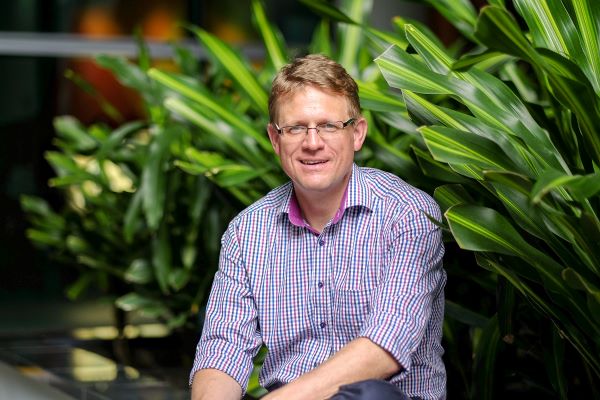
By Alistair Jones
SMU Office of Research – In 2021, Singapore's Ministry of Education awarded funding to a project at Singapore Management University (SMU) led by Jochen Reb, a Professor of Organisational Behaviour and Human Resources.
The aim was to create a 12-week undergraduate elective module – Mindfulness-Based Holistic Education (MBHE) – targeting final-year students at SMU, and to assess its effectiveness.
Trialled across two academic terms, the project was completed in the middle of this year. According to the research team, the results provide quantitative evidence for the effectiveness of an MBHE program in tertiary education in fostering students’ personal growth and wellbeing.

"Yes, we are pleased with the module's results," say Professor Reb and his PhD student Eva Peters.
"It is great to see that student wellbeing increased significantly after taking the module compared not only to the measurement before the beginning of the module, but also compared to the group of students who took a different module, [which allowed for] a more rigorous research design.
"The results definitely met our expectations as they align with what we know about the effects of mindfulness training in other contexts, such as the workplace. That said, the results also exceeded our expectations, as we did not expect the course's effects to be so positive across such a range of many variables we included in the study.
"[Something that] surprised us was the extent of students' problems with social media and how it affects their wellbeing and functioning. For example, overuse and night-time use of social media lead to insufficient sleeping hours and this problem seems to be more widespread than we had expected," the researchers say.
Emotions and acceptance
The study's intervention effects ranged from an increase in positive attributes, such as decision-making, to a decrease in negative feelings, such as worry and stress. The leading positive effect was the 'ability to describe emotions', which is an individual's capacity to recognise, label and articulate their emotions accurately.
"The increased ability to describe emotions is a significant outcome of our course for several reasons," the researchers say.
"First, being able to describe emotions enhances self-awareness, allowing individuals to better understand their emotional states and triggers. This leads to improved emotional regulation and healthier responses to stress or challenges.
"Second, when individuals can clearly describe their emotions, they communicate more effectively with others. This helps resolve conflicts, express needs and build stronger personal and professional relationships.
"Third, emotions influence our decisions. Being able to identify and describe them helps individuals make more thoughtful, informed decisions rather than reacting impulsively.
"Finally, recognising and expressing emotions is key to emotional wellbeing. Bottling up or misinterpreting emotions can lead to anxiety, frustration and stress."
Second highest on the list of positive effects was 'acceptance'.
"This is another very nice outcome of the study," the researchers say. "In fact, acceptance is a key component of mindfulness and one that we believe does not receive as much recognition as it should, given how powerful it can be. In the context of mindfulness, acceptance means allowing the truth to be exactly what it is.
"Acceptance is not the passive resignation to whatever fate one is facing. Instead, it’s the crucial step an individual needs to take before being able to make any meaningful change in their lives. We need to accept our situation first before we can do anything about it."
Cognitive reframing
"MBHE creates a learning environment where students cultivate self-awareness, self-regulation, self-confidence and interpersonal skills within the broader context of management education," the researchers say.
It is hoped that the module can serve as a catalyst for advancing socio-emotional education by addressing what the researchers see as a pressing need to shift from a knowledge-based and reproduction focus to generative and holistic learning.
"Holistic learning encourages a broader, deeper understanding of concepts. It supports students in developing critical thinking, creativity, emotional intelligence and social skills including compassion," the researchers say.
"Holistic learning specifically involves considering the whole person in the learning process, including the body and emotions, and not just the cognitive acquisition of information. Generative learning is an active learning process where students construct meaning by connecting new information with prior knowledge and experiences."
The course merges mindfulness and positive psychology.
"In the past, psychology was mostly concerned with treating disease and reducing suffering, as opposed to promoting flourishing and positive human development. As such, positive psychology studies how to promote positive psychological states, traits and experiences," the researchers say.
As an example, students can be asked to bring to mind a current challenge.
"They then mindfully observe their present moment experience related to this challenge. Over the course of the practice, they are asked to reflect on beliefs they may hold related to the challenge and whether changing these beliefs might aid them in approaching the challenge more effectively.
"This practice thus leverages the mindfulness effect of increased mental flexibility and openness and pairs it with cognitive reframing, a concept core to positive psychology interventions."
Action-oriented
Skeptics of mindful meditation suggest that its inward focus could make it the enemy of activism. And that while some causes of stress and worry are internal, we are also influenced by the political and economic frameworks that shape how we live.
"The MBHE course does not solely focus on turning inward and developing internal abilities such as focus and concentration. We also explicitly include practices and discussions that are very much action-oriented rather than solely reflective," the researchers say.
"We do not place the sole responsibility for mitigating stress and worry on the students along the lines of, 'the system is how it is; you must learn how to deal with it better'.
"Instead, we make clear that while there is a lot one can do internally to manage the demands and stressors of everyday life, it is important to acknowledge dysfunctional systems and structures and make individual choices as to how one wishes to support or perhaps work to improve and change the larger context for oneself, and others living in the same context," the researchers say.
The MBHE course has become part of the SMU curriculum and the first class was completely full with 45 students.
"We, of course, hope that the demand for the course increases over time. In that case, we plan to offer more sessions. We strongly believe that the more students that take the course, the better," the researchers say.
Back to Research@SMU November 2024 Issue
See More News
Want to see more of SMU Research?
Sign up for Research@SMU e-newslettter to know more about our research and research-related events!
If you would like to remove yourself from all our mailing list, please visit https://eservices.smu.edu.sg/internet/DNC/Default.aspx

